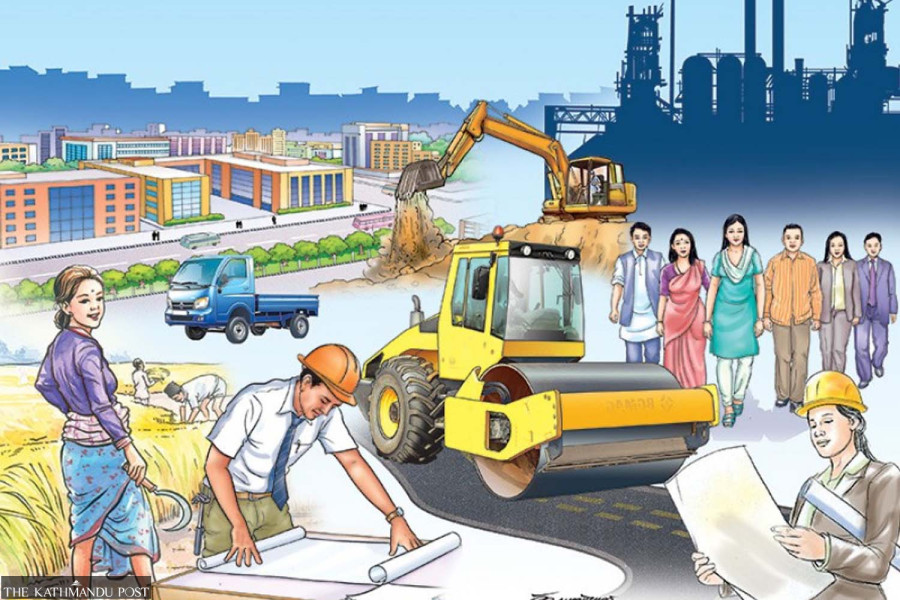National
Are MPs lawmakers or development workers?
Politicians say they are forced to make promises related to development works to appeal to the masses during polls.
Tika R Pradhan
Addressing a public function on Sunday, lower house candidate from Kathmandu constituency-2 and former Speaker Onsari Gharti said she would resign as lawmaker if she failed to upgrade the Jorpati-Sankhu road section within two years of her election.
Subas Nembang, the chairman of two Constituent Assemblies elected in 2008 and 2013 who is contesting from Ilam-2, points to the development projects he has helped build in remote parts of Ilam when asked why he should be reelected to Parliament.
These two candidates have made a host of promises, most of them related to the completion of local projects, to their electorate.
Addressing an election campaign of the ruling coalition at Kandaghari in Kathmandu, Gharti also promised to develop the old town of Sankhu and the Salinadi river area as tourist destinations; convert the Jaharsinghpauwa hilltop into a living museum; complete the under-construction cricket stadium at Mulpani; and set up an Agriculture and Forestry College at Nanglebhare in the northeast of Kathmandu.
These cases show how Nepali lawmakers depend on development pledges to win elections. Amid the debate on whether lawmakers should deal with development projects or mostly stick to lawmaking, politicians say they are forced to make development-related promises to appeal to the masses.
Some former lawmakers said this will continue to be the case so long as the country has a system of picking ministers from among lawmakers: election candidates spend tens of millions to ensure their win in the hopes of becoming ministers and recouping their money.
“We need to change the existing system,” said Ram Narayan Bidari, a former member of the National Assembly. “The constitution has not envisioned any role for lawmakers as development project managers, and what they are doing violates the spirit of the constitution.”
Bidari claims the election manifesto of his party, the CPN (Maoist Centre), talks about training its members of parliament on lawmaking and not on the nitty-gritty of development projects.
“We have also proposed a directly-elected executive President and appointment of ministers from among field experts instead of lawmakers,” Bidari told the Post. “This provision will help cure the existing ills of expensive elections and corruption.”
However, his party chair Pushpa Kamal Dahal, during the same election event where Gharti was speaking, said he would ensure Gharti got a development-related ministry if the locals of Kathmandu-2 elected her.
Lawmakers, whether they are from federal parliament or provincial assemblies, are primarily focussed on local projects. This is the reason they started the provision of constituency development funds that the lawmakers could spend in their respective constituencies as they choose.
Due to widespread criticism, the programme for federal lawmakers was discontinued this year, but provinces continue to make such allocations.
According to Bidari, a study by the Delegated Management and Government Assurance Committee of the upper house, had found that only 20 percent of laws were developed by the legislature while 80 percent of them were prepared by the executive—ministers, whose job is to plan and implement development projects.
“The job of lawmakers, especially at the federal level, is not to compete with ward representatives on development works,” Bidari, the committee chair, said. “Lawmakers have their own responsibilities, and they should let the ward representatives do their work.”
Senior advocate and former member of the National Assembly Radheshyam Adhikari, who was involved in the constitution-drafting process as a member of both the Constituent Assemblies, said lawmakers have failed to convince their voters that their role is limited to drafting laws and facilitating development works.
“We have many examples of how the lack of laws has been seriously affecting the economic activities and development works of the country,” Adhikari told the Post. “A lawmaker is not responsible for building roads and bridges, and they should instead facilitate and ensure timely construction of such infrastructures by drafting proper policies and laws.”
Many development activities, according to Adhikari, would suffer because the latest parliament could not make some essential laws including one related to the tourism sector—separating regulator and operator of airlines which could lead to Nepal’s blacklisting by the European Commission. Another example, Adhikari said, was the bill related to electricity, absence of which will have adverse effects on development works. Lawmakers should work to unbundle the Nepal Electricity Authority into three units—electricity generation, transmission and distribution, he said.
Federal lawmakers’ failure to formulate umbrella laws on education, civil service and police have hamstrung the provincial and local governments and given rise to a negative impression about federalism.
“Many bills related to facilitating economic activities and development works have either faced obstructions in Parliament or been aborted under different pretexts,” Adhikari said. “If effective laws are in place, then they will automatically boost development works. So lawmakers should focus on making better laws.”
The constitution has listed exclusive and concurrent powers and responsibilities of the federal, provincial and local governments. Even if there is confusion over concurrent powers of different governments regarding development projects, it is the duty of lawmakers to end such confusion through necessary laws and ensure that development activities continue effectively.
There were no local representatives for nearly two decades before 2017. At that time lawmakers had to look after development activities of their constituencies, but that is no longer the case, observers say.
“People should now understand the lawmakers have the distinctive role of making laws instead of focusing on development activities,” Daman Nath Dhungana, a former Speaker and civil society leader, says.




 18.12°C Kathmandu
18.12°C Kathmandu














